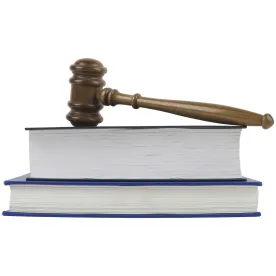In a decision seen as a groundbreaking show of reciprocity, the Wuhan Intermediate People's Court in the People’s Republic of China (PRC) (Wuhan Court) on June 30, 2017, recognized a commercial judgment rendered by the Los Angeles County Superior Court. This action by a Chinese court enforcing a U.S. commercial judgment is seen as a “first” and hopefully a harbinger of future reciprocity between the two legal systems.
Background & Judgment Entered by Los Angeles Superior Court
The judgment at issue had been entered by the California Superior Court for the County of Los Angeles in the matter of Liu Li v. Tao Li and Tong Wu, LASC Case No. EC062608. In that case, Judge William D. Stewart had entered a default judgment against Chinese citizens Li Tao and Wu Tong and in favor of Li Liu. The suit had been filed in the Los Angeles County Superior Court on July 17, 2014, by Liu and alleged the breach of an equity transfer agreement and fraudulent misappropriation of $125,000. The California state court complaint alleged that in September 2013, Liu, Tao and Tong entered into an Equity Transfer Agreement providing that Tao and Tong would transfer to Liu a 50 percent equity interest held in JiaJia Management Inc. for consideration of US$150,000. Liu alleged that US$125,000 was paid and Tao and Tong had fabricated the share transfer agreement to misappropriate the funds.
California counsel for Liu obtained an investigation report containing contact information, including the addresses of Tao and Tong. Service was attempted but evaded. Judge Stewart then granted Liu’s application that service be effected by publication in a local newspaper. The service was published repeatedly during the period January 15 – February 5, 2015. Judge Stewart entered a default judgment against Tao and Tong on July 24, 2015. With prejudgment interest, the total amount of the California state court judgment was $147,492. When efforts to execute the judgement in the United States did not succeed, Liu proceeded in China and applied to the Wuhan Court to have the California state court judgment recognized and enforced against assets located in Wuhan, Hubei Province. The matter was heard in the Wuhan Court on December 25, 2015, and March 15, 2016. Both sides appeared by counsel.
Ruling by the Wuhan Intermediate Court
On June 30, 2017, the Wuhan Court issued its order recognizing the decision of the California Superior Court on the following grounds:
-
Petitioner Li Liu submitted an application for recognition and enforcement of a certified copy of Judge Stewart’s judgment in compliance with the format requirements of applying for recognition and enforcement of a foreign judgment.
-
The Wuhan Court had jurisdiction over the matter due to the presence of real property owned by Tao and Tong located in Wuhan City, Hubei.
-
The Wuhan Court rejected the argument by Tao and Tong that they did not receive notice to participate in litigation from the U.S. court, based on proof of notice submitted by Liu, including the investigation report, Judge Stewart’s order approving service by publication and the published announcements.
-
The Wuhan Court refused to question the merits of the allegations supporting the underlying default judgment because the matter was presented as a judicial assistance case, which did not involve the review of parties’ substantial rights and obligations.
-
The Wuhan Court found that recognizing the judgment by the Los Angeles Superior Court would not violate the People’s Republic of China’s “essential principles or country sovereignty, security, public social interest.”
-
Because the Los Angeles Superior Court had previously recognized a civil judgment entered by the Intermediate Court of Wuhan City, Hubei Province, the Wuhan Court held that “It can be proved that there is reciprocal relationship to recognize and enforce civil judgment between the two countries.” Liu had provided evidence of the order by the United States District Court for the Central District of California in the case of Hubei Gezhouba Sanlian Industrial Co.Ltd v. Robinson co., Inc. Case No. 2:06-cv-01798-FMC-SS (2009) (Hubei Helicopters).
The Wuhan Court’s finding of reciprocity is essential to the decision. Article 282 of the Civil Procedure Law of the PRC requires an international treaty or reciprocity before a Chinese court may recognize a foreign judgment. Specifically, it provides:
“Having received an application or a request for recognition and enforcement of a legally effective judgment or ruling of a foreign court, a people's court shall review such judgment or ruling pursuant to international treaties concluded or acceded to by the People's Republic of China or in accordance with the principle of reciprocity.”
The PRC and the United States have not acceded to any international treaty related to the mutual recognition and enforcement of each other’s court judgments. Therefore, the recognition and enforcement of a U.S. court judgment by a PRC court must rest on a finding of reciprocity between the two countries. The Wuhan Court determined that a reciprocal relationship existed between the PRC and the United States for the mutual recognition and enforcement of each other’s civil judgments based on the Central District of California’s 2009 decision on a commercial judgment rendered by a Chinese court located in Hubei province in the Hubei Helicopters case. The Central District of California’s ruling in that case centered on the Uniform Foreign-Money Judgments Recognition Act and did not rely on any finding of a reciprocal relationship between the United States and the People’s Republic of China.
Comment
The Wuhan Court’s recognition of a California commercial judgment is certainly a positive and landmark development in the legal relationship between the world’s two largest economies. For multiple reasons, however, one should be cautioned that this single example of reciprocity will not guarantee that other U.S. commercial judgments will be recognized and enforced by Chinese courts.
-
First, the PRC courts do not operate under a common law system, and this action by the Wuhan Court is not binding on any other similar case.
-
Second, the defendants, Tao and Tong, were sued as individuals and the causes of action by Liu were not alleged against a state-owned enterprise or other entity that may have a relationship with local PRC government or political party structures.
-
Third, although the Wuhan Court’s ruling finds reciprocity between U.S. and Chinese courts, both the Hubei Helicopters case and the Liu v. Tao and Tong judgment involved courts located within the state of California and the province of Wuhan.
It remains to be seen how other Chinese jurisdictions will treat judgments from California or any other U.S. state courts.



 />i
/>i
